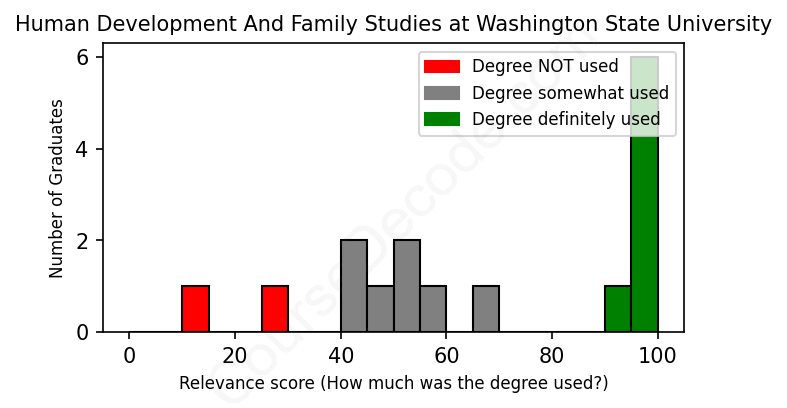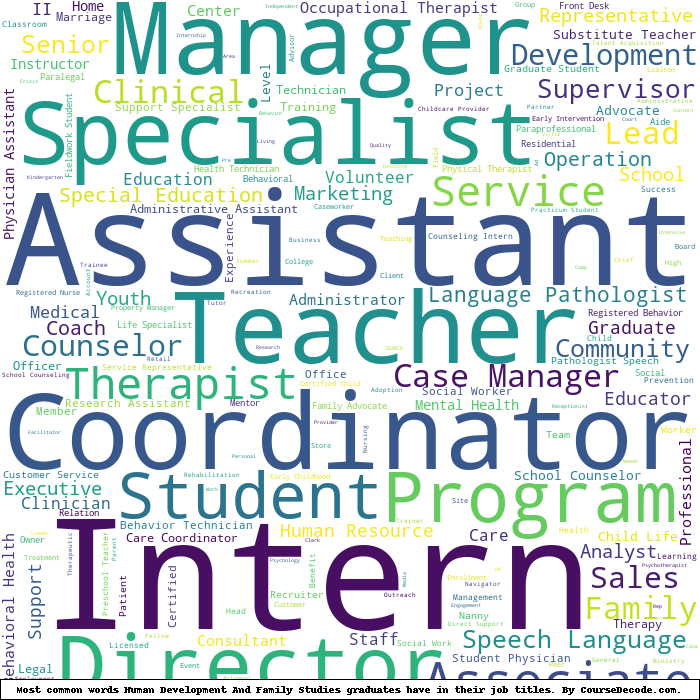
First, some facts. Of the Human Development And Family Studies graduates from Washington State University we've analyzed , here's how many have used (or NOT used) their degree in their career:

These are estimates based on AI analysis of 16 LinkedIn profiles (see below).
The verdict? On par with the average. Overall, with an average relevance score of 67%, Human Development And Family Studies graduates from Washington State University have about the same likelihood of finding work in this field as the average graduate across all fields:
And for comparison, here's the chart for all profiles we've looked at across all degrees.
Also, after graduating, only 12% of these graduates have pursued further education other than another Bachelor's degree (such as a Masters degree or other), compared to the average across all profiles of 35%. This suggests a Bachelors degree is enough for most Human Development And Family Studies graduates, and it's normal to look for work straight after graduation.
See the details:
|
Relevance score: 97% We think this person has gone into a career highly relevant to their degree. We think this person has gone into a career highly relevant to their degree.
DEGREE INFOGraduated in 2018 from Washington State University with a Bachelor's degree in Human Development And Family Studies. No other secondary education since. JOB HISTORY SINCE GRADUATIONIntern TACOMA URBAN LEAGUE May 2018 - Aug 2018 Site Director  YMCA of Pierce and Kitsap Counties Jun 2019 - Present ABOUTNo information provided. |
The top 10 most common jobs done by the graduates we've analyzed (ranked most common to least) are:
From the list of jobs held by graduates of Human Development and Family Studies from Washington State University, it seems like the most common roles are in fields that directly engage with community services and child development. Many graduates found themselves working in settings like social services, education, and health care, particularly focusing on roles such as Family Advocate, Early Childhood Educator, and Vocational Rehabilitation Counselor. These positions heavily rely on the principles and knowledge gained from their degree, such as understanding family dynamics, child development, and supportive community practices.
However, not all graduates ended up in roles that are closely related to their studies. Some took positions in areas like property management and sales, where they could leverage interpersonal skills but were largely disconnected from the core curriculum of Human Development and Family Studies. Similarly, jobs in human resources or administrative roles appeared but often required minimal application of their specialized education. Overall, while many graduates are successfully applying their knowledge in relevant fields, a significant number have ventured into jobs that do not fully utilize their education, resulting in a mixed landscape of job relevance among these individuals.
Here is a visual representation of the most common words in job titles for Human Development And Family Studies graduates (this is across all Human Development And Family Studies graduates we've analyzed, not just those who went to Washington State University):

So, if you're looking at what graduates from Washington State University with a degree in Human Development and Family Studies are doing, you'll see a pretty mixed bag, but with some clear trends. Right out of college, many seem to land jobs in social services, education, or nonprofit organizations. For example, recent grads took on roles as case managers, program managers, and educators at places like Head Start or organizations focusing on family services. These initial jobs are closely tied to their studies, which shows they are applying what they've learned to help families and children in meaningful ways.
However, as we look 5 or even 10 years down the line, not everyone stays in those human development-related fields. Some graduates move into management positions in corporate environments, and you even see a few pivoting to seemingly unrelated careers like property management or human resources. While some certainly continue to work in social services or education, others might find themselves taking on roles that utilize their skills but don't directly connect to their degree. Overall, there are definitely successful career paths being followed, but there’s also a significant portion of graduates who seem to drift away from the core focus of their studies, taking on roles that might not be as relevant to human development. So, while there’s a solid start for many, the long-term picture is a bit of a mixed bag.
Honestly, a Bachelor’s degree in Human Development and Family Studies at Washington State University is generally considered to be on the easier side compared to some other majors. You’ll find a lot of courses focused on understanding human behavior, relationships, and family dynamics, which can be super interesting and relatable. While there will definitely be some challenging assignments and projects, especially if you're diving into research or theory, the material is usually approachable and engaging. Plus, many students find the supportive environment and professors really help make the journey smoother. So, if you have a passion for understanding people and families, you'll probably enjoy the process more than you’d stress over the difficulty!
Most commonly, in the LinkedIn profiles we've looked at, it takes people 4 years to finish a Bachelor degree in Human Development And Family Studies.
So, looking at the job histories of these Washington State University grads, it seems like they’ve had a pretty mixed bag when it comes to making decent money. Some of the folks who graduated earlier, like the ones in 2011 and 2012, started in a lot of volunteer or entry-level roles, which probably means their paychecks weren't super impressive at the beginning. However, others, like the 2014 graduates who went into sports and management positions, might be raking in a better salary now. The more recent grads, especially those in education and counseling roles, tend to start lower on the pay scale but have potential to grow over time. Overall, while some are likely doing alright for themselves now, others might need a few more years and career moves to see some solid cash flow.
Here is a visual representation of the most common words seen in the "about" section of LinkedIn profiles who have a Bachelor degree in Human Development And Family Studies (this is across all Human Development And Family Studies graduates we've analyzed, not just those who went to Washington State University). This may or may not be useful:

Here are all colleges offering a Bachelor degree in Human Development And Family Studies (ordered by the average relevance score of their Human Development And Family Studies graduates, best to worst) where we have analyzed at least 10 of their graduates:
| College | Score | Count |
|---|---|---|
 Oklahoma State University Oklahoma State University
|
91 | 10 |
 University of Wisconsin-Madison University of Wisconsin-Madison
|
84 | 15 |
 University of Wisconsin-Stout University of Wisconsin-Stout
|
83 | 22 |
 The University of Texas at Austin The University of Texas at Austin
|
81 | 14 |
 Virginia Tech Virginia Tech
|
80 | 12 |
 The Ohio State University The Ohio State University
|
77 | 12 |
 Penn State University Penn State University
|
76 | 34 |
 University of California, Davis University of California, Davis
|
76 | 18 |
 Kansas State University Kansas State University
|
75 | 17 |
 University of North Texas University of North Texas
|
74 | 12 |
 University of Illinois at Urbana-Champaign University of Illinois at Urbana-Champaign
|
74 | 12 |
 Brigham Young University Brigham Young University
|
73 | 28 |
 University of Connecticut University of Connecticut
|
72 | 22 |
 Michigan State University Michigan State University
|
71 | 18 |
 Texas Tech University Texas Tech University
|
70 | 26 |
 Colorado State University Colorado State University
|
69 | 41 |
 Bowling Green State University Bowling Green State University
|
69 | 18 |
 University of Rhode Island University of Rhode Island
|
69 | 14 |
 Oregon State University Oregon State University
|
68 | 28 |
 Washington State University Washington State University
|
67 | 16 |
 University of Arizona University of Arizona
|
62 | 13 |
 The University of Alabama The University of Alabama
|
62 | 10 |
 Arizona State University Arizona State University
|
61 | 29 |
 The University of Georgia The University of Georgia
|
61 | 17 |
 University of North Carolina at Greensboro University of North Carolina at Greensboro
|
58 | 14 |
 California State University San Marcos California State University San Marcos
|
49 | 12 |